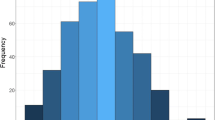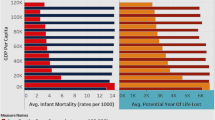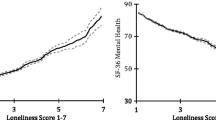Abstract
Objectives
To investigate whether intergenerational mobility in education and income are associated with levels of psychological distress in Canada, a context in which rates of intergenerational mobility are higher than those of the United States but lower than those of Nordic countries.
Methods
The data came from the Longitudinal and International Study of Adults (LISA) linked to tax records from the Canada Revenue Agency (N = 4100). Diagonal reference models were used to investigate whether educational mobility and income mobility were associated with levels of psychological distress in adulthood as assessed by the Kessler (K-10) scale. The models controlled for sociodemographic characteristics and were stratified by gender.
Results
Although we did not find that mobility in general was associated with greater levels of psychological distress, we found that downward educational mobility in particular corresponded to higher levels of psychological distress (b = 0.15 with 95% CI = 0.00, 0.31) among men.
Conclusion
Overall, we found no strong evidence that social mobility in general is impactful for levels of psychological distress, but downward educational mobility in particular may have negative consequences for the mental health of men. In addition, a notable gradient between income and psychological distress in adulthood was observed for both women and men.
Résumé
Objectifs
Étudier dans quelle(s) mesure(s) la mobilité intergénérationnelle en matière d’éducation et de revenu est associée aux niveaux de détresse psychologique au Canada, dans un contexte où les taux de mobilité intergénérationnelle sont plus élevés qu’aux États-Unis, mais plus faibles que dans les pays nordiques.
Méthodes
Les données proviennent de l’Étude longitudinale et internationale des adultes (ELIA) reliée aux dossiers fiscaux de l’Agence du revenu du Canada (N = 4 100). Des modèles de référence diagonaux ont été utilisés pour déterminer si la mobilité éducationnelle et la mobilité des revenus étaient associées aux niveaux de détresse psychologique à l’âge adulte, tels qu’évalués par l’échelle de Kessler (K-10). Les modèles ont tenu compte des caractéristiques sociodémographiques et ont été stratifiés en fonction du genre.
Résultats
Bien que nous n’ayons pas trouvé que la mobilité en général était associée à des niveaux plus élevés de détresse psychologique, nous avons trouvé que la mobilité éducationnelle descendante correspondait à des niveaux plus élevés de détresse psychologique (b = 0,15 avec IC 95% = 0,00, 0,31) chez les hommes.
Conclusion
Dans l’ensemble, nous n’avons pas trouvé de preuves solides que la mobilité sociale en général a un impact sur les niveaux de détresse psychologique, mais la mobilité éducationnelle descendante en particulier peut avoir des conséquences négatives sur la santé mentale des hommes. En outre, un gradient notable entre le revenu et la détresse psychologique à l’âge adulte a été observé tant chez les femmes que chez les hommes.
Similar content being viewed by others
Availability of data and material
The data came from the Longitudinal and International Study of Adults (LISA) linked to T1 Family Files from the Canada Revenue Agency. Data are available in the Research Data Centres (RDC) in 33 universities across Canada for researchers who meet the criteria for access to confidential data. Statistical analyses were conducted at the UBC-RDC.
Code availability
Stata syntax files require vetting from the RDC staff.
References
Bougie, E., Arim, R. G., Kohen, D. E., & Findlay, L. C. (2016). Validation of the 10-item Kessler psychological distress scale (K10) in the 2012 Aboriginal peoples survey. Health Reports, 27(1), 3–10. https://www150.statcan.gc.ca/n1/pub/82-003-x/2016001/article/14307-eng.htm#shr-pg0
Bulczak, G., Gugushvili, A., & Zelinska, O. (2021). How are social origin, destination and mobility linked to physical, mental, and self-rated health? Evidence from the United States. Quality & Quantity. https://doi.org/10.1007/s11135-021-01286-5
Chow, A., & Guppy, N. (2021). Intergenerational educational mobility over the past century in Canada. Canadian Review of Sociology, 58(3), 372–398. https://doi.org/10.1111/cars.12348
Connolly, M., Haeck, C., & Lapierre, D. (2021). Trends in intergenerational income mobility and income inequality in Canada. https://www150.statcan.gc.ca/n1/en/catalogue/11F0019M2021001
Corak, M. (2013). Income inequality, equality of opportunity, and intergenerational mobility. Journal of Economic Perspectives, 27(3), 79–102. https://doi.org/10.1257/jep.27.3.79
Culatta, E., & Clay-Warner, J. (2021). Falling behind and feeling bad: Unmet expectations and mental health during the transition to adulthood. Society and Mental Health, 11(3), 251–265. https://doi.org/10.1177/2156869321991892
Ellis, R. A., & Lane, W. C. (1967). Social mobility and social isolation: A test of Sorokin’s dissociative hypothesis. American Sociological Review, 32(2), 237–253. https://doi.org/10.2307/2091814
Fassaert, T., De Wit, M. A. S., Tuinebreijer, W. C., Wouters, H., Verhoeff, A. P., Beekman, A. T. F., & Dekker, J. (2009). Psychometric properties of an interviewer-administered version of the Kessler Psychological Distress scale (K10) among Dutch, Moroccan and Turkish respondents. International Journal of Methods in Psychiatric Research, 18(3), 159–168. https://doi.org/10.1002/mpr.288
Friedman, S. (2016). Habitus Clivé and the emotional imprint of social mobility. The Sociological Review, 64(1), 129–147. https://doi.org/10.1111/1467-954X.12280
Gugushvili, A., Zhao, Y., & Bukodi, E. (2019). ‘Falling from grace’ and ‘rising from rags’: Intergenerational educational mobility and depressive symptoms. Social Science & Medicine, 222, 294–304. https://doi.org/10.1016/j.socscimed.2018.12.027
Houle, J. N., & Martin, M. A. (2011). Does intergenerational mobility shape psychological distress? Sorokin revisited. Research in Social Stratification and Mobility, 29(2), 193–203. https://doi.org/10.1016/j.rssm.2010.11.001
Jonsson, F., Sebastian, M. S., Hammarström, A., & Gustafsson, P. E. (2017). Intragenerational social mobility and functional somatic symptoms in a northern Swedish context: Analyses of diagonal reference models. International Journal for Equity in Health, 16(1), 1. https://doi.org/10.1186/s12939-016-0499-1
Kaiser, C. (2018). DRM diagonal reference model stata. Open Science Framework. https://doi.org/10.17605/OSF.IO/KFDP6
Kessler, R. C., Barker, P. R., Colpe, L. J., Epstein, J. F., Gfroerer, J. C., Hiripi, E., Howes, M. J., Normand, S.-L.T., Manderscheid, R. W., Walters, E. E., & Zaslavsky, A. M. (2003). Screening for serious mental illness in the general population. Archives of General Psychiatry, 60(2), 184–189. https://doi.org/10.1001/archpsyc.60.2.184
Lee, E. M., & Kramer, R. (2012). Out with the old, in with the new? Habitus and social mobility at selective colleges. Sociology of Education, 86(1), 18–35. https://doi.org/10.1177/0038040712445519
Narayan, A., Van der Weide, R., Cojocaru, A., Lakner, C., Redaelli, S., Gerszon Mahler, D., Ramasubbaiah, R. G. N., & Thewissen, S. (2018). Fair progress? Economic mobility across generations around the world. World Bank Publications.
Newman, K. S. (1999). Falling from grace: Downward mobility in the age of affluence. University of California Press.
Palmater, P. D. (2011). Stretched beyond human limits: Death by poverty in first nations. Canadian Review of Social Policy, 65/66, 112–127. https://www.jstor.org/stable/48670203
Pendakur, K., & Pendakur, R. (2011). Aboriginal income disparity in Canada. Canadian Public Policy, 37(1), 61–83. https://doi.org/10.3138/cpp.37.1.61
Reay, D., Crozier, G., & Clayton, J. (2009). ‘Strangers in paradise’?: Working-class students in elite universities. Sociology, 43(6), 1103–1121. https://doi.org/10.1177/0038038509345700
Sampasa-Kanyinga, H., Zamorski, M. A., & Colman, I. (2018). The psychometric properties of the 10-item Kessler Psychological Distress Scale (K10) in Canadian military personnel. PLOS ONE, 13(4), e0196562. https://doi.org/10.1371/journal.pone.0196562
Schuck, B., & Steiber, N. (2018). Does intergenerational educational mobility shape the well-being of young Europeans? Evidence from the European Social Survey. Social Indicators Research, 139(3), 1237–1255. https://doi.org/10.1007/s11205-017-1753-7
Simard-Duplain, G., & St-Denis, X. (2020). Exploration of the role of education in intergenerational income mobility in Canada: Evidence from the Longitudinal and International Study of Adults. Canadian Public Policy, 46(3), 369–396. https://doi.org/10.3138/cpp.2019-072
Sorokin, P. A. (1927). Social mobility. Harper and Brothers.
Statistics Canada. (2016). Longitudinal and International Study of Adults (LISA). https://www23.statcan.gc.ca/imdb/p2SV.pl?Function=getSurvey&Id=148150
Steiber, N. (2019). Intergenerational educational mobility and health satisfaction across the life course: Does the long arm of childhood conditions only become visible later in life? Social Science & Medicine, 242, 112603. https://doi.org/10.1016/j.socscimed.2019.112603
van der Waal, J., Daenekindt, S., & de Koster, W. (2017). Statistical challenges in modelling the health consequences of social mobility: The need for diagonal reference models. International Journal of Public Health, 62(9), 1029–1037. https://doi.org/10.1007/s00038-017-1018-x
Veenstra, G., & Vanzella-Yang, A. (2021). Intergenerational social mobility and self-rated health in Canada. SSM - Population Health, 15, 100890. https://doi.org/10.1016/j.ssmph.2021.100890
Willson, A. E., & Shuey, K. M. (2016). Life course pathways of economic hardship and mobility and midlife trajectories of health. Journal of Health and Social Behavior, 57(3), 407–422. https://doi.org/10.1177/0022146516660345
Zang, E., & De Graaf, N. D. (2016). Frustrated achievers or satisfied losers? Inter- and intragenerational social mobility and happiness in China. Sociological Science, 3(33). https://doi.org/10.15195/v3.a33
Zang, E., Sobel, M. E., & Luo, L. (2023). The mobility effects hypothesis: Methods and applications. Social Science Research, 110, 102818. https://doi.org/10.1016/j.ssresearch.2022.102818
Zhao, Y., Li, Y., Heath, A., & Shryane, N. (2017). Inter- and intra-generational social mobility effects on subjective well-being – evidence from mainland China. Research in Social Stratification and Mobility, 48, 54–66. https://doi.org/10.1016/j.rssm.2017.02.002
Acknowledgements
This article is based on chapter 5 of Vanzella Yang’s (2022) doctoral dissertation, titled “Socioeconomic resources and adult mental health in Canada,” which can be accessed on UBC Library’s Open Collections (Theses and Dissertations): Vanzella Yang, A. P. (2022). Socioeconomic resources and adult mental health in Canada. https://dx.doi.org/10.14288/1.0416260
Funding
This research was supported by a Joseph-Armand Bombardier Canada Graduate Scholarship awarded to AVY and an Insight Grant awarded to GV, both from the Social Sciences and Humanities Research Council of Canada (SSHRC). Currently, AVY is supported by a SSHRC Postdoctoral Fellowship (#756–2022-0048).
Author information
Authors and Affiliations
Contributions
Both authors contributed to the study conception and design. Vanzella-Yang conducted statistical analyses and wrote the original draft. Both authors read and approved the final manuscript.
Corresponding author
Ethics declarations
Ethics approval
The project was approved by The University of British Columbia Behavioural Ethics Board (certificate number H18-02461).
Consent to participate
Not applicable.
Consent for publication
Not applicable.
Conflict of interest
The authors declare no competing interests.
Additional information
Publisher's Note
Springer Nature remains neutral with regard to jurisdictional claims in published maps and institutional affiliations.
Rights and permissions
Springer Nature or its licensor (e.g. a society or other partner) holds exclusive rights to this article under a publishing agreement with the author(s) or other rightsholder(s); author self-archiving of the accepted manuscript version of this article is solely governed by the terms of such publishing agreement and applicable law.
About this article
Cite this article
Vanzella-Yang, A., Veenstra, G. Social mobility and mental health in Canada. Can J Public Health 115, 148–156 (2024). https://doi.org/10.17269/s41997-023-00818-w
Received:
Accepted:
Published:
Issue Date:
DOI: https://doi.org/10.17269/s41997-023-00818-w




